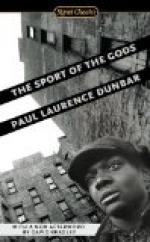Once in New York, he found that people wished to see him, some fools, some philanthropists, and a great many reporters. He had to be photographed—all this before he could seek those whom he longed to see. They printed his picture as he was before he went to prison and as he was now, a sort of before-and-after-taking comment, and in the morning that it all appeared, when the Universe spread itself to tell the public what it had done and how it had done it, they gave him his wife’s address.
It would be better, they thought, for her to tell him herself all that happened. No one of them was brave enough to stand to look in his eyes when he asked for his son and daughter, and they shifted their responsibility by pretending to themselves that they were doing it for his own good: that the blow would fall more gently upon him coming from her who had been his wife. Berry took the address and inquired his way timidly, hesitatingly, but with a swelling heart, to the door of the flat where Fannie lived.
XVIII
WHAT BERRY FOUND
Had not Berry’s years of prison life made him forget what little he knew of reading, he might have read the name Gibson on the door-plate where they told him to ring for his wife. But he knew nothing of what awaited him as he confidently pulled the bell. Fannie herself came to the door. The news the papers held had not escaped her, but she had suffered in silence, hoping that Berry might be spared the pain of finding her. Now he stood before her, and she knew him at a glance, in spite of his haggard countenance.
“Fannie,” he said, holding out his arms to her, and all of the pain and pathos of long yearning was in his voice, “don’t you know me?”
She shrank away from him, back in the hall-way.
“Yes, yes, Be’y, I knows you. Come in.”
She led him through the passage-way and into her room, he following with a sudden sinking at his heart. This was not the reception he had expected from Fannie.
When they were within the room he turned and held out his arms to her again, but she did not notice them. “Why, is you ‘shamed o’ me?” he asked brokenly.
“’Shamed? No! Oh, Be’y,” and she sank into a chair and began rocking to and fro in her helpless grief.
“What ’s de mattah, Fannie? Ain’t you glad to see me?”
“Yes, yes, but you don’t know nothin’, do you? Dey lef’ me to tell you?”
“Lef’ you to tell me? What ’s de mattah? Is Joe or Kit daid? Tell me.”
“No, not daid. Kit dances on de stage fu’ a livin’, an’, Be’y, she ain’t de gal she ust to be. Joe—Joe—Joe—he ‘s in pen’tentiary fu’ killin’ a ooman.”
Berry started forward with a cry, “My Gawd! my Gawd! my little gal! my boy!”
“Dat ain’t all,” she went on dully, as if reciting a rote lesson; “I ain’t yo’ wife no mo’. I ’s ma’ied ag’in. Oh Be’y, Be’y, don’t look at me lak dat. I could n’t he’p it. Kit an’ Joe lef’ me, an’ dey said de pen’tentiary divo’ced you an’ me, an’ dat you ’d nevah come out nohow. Don’t look at me lak dat, Be’y.”




